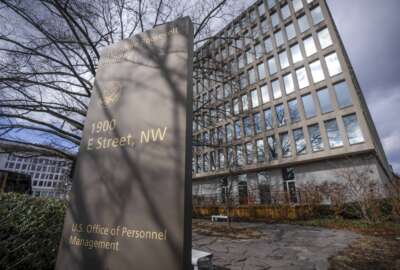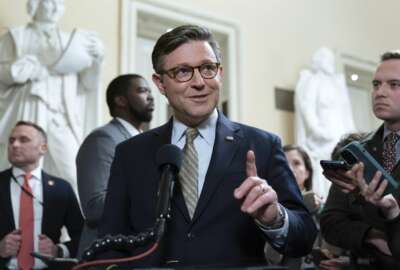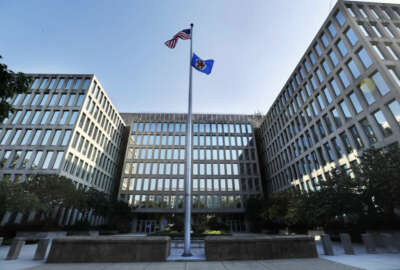Recalling Jimmy Carter, the great de-regulator
"He had the humility to go back and to look at whether some of his own policies might be contributing to that inflation," said Susan Dudley.
Republican presidents often get credit for cutting back on federal regulation. But the most significant de-regulator of modern times just might be the Democrat about to lie in state at the U.S. Capitol. In many ways, you can thank Jimmy Carter for that $99 flight to the coast for a quick getaway. The Federal Drive with Tom Temin got a review from the director of regulatory studies at George Washington University, Susan Dudley.
Interview transcript:
Tom Temin We should also point out you speak as former OIRA director. And so you’ve been both in and out of the regulatory climate. But tell us more about that history. There were several big sets of infrastructure services that Carter oversaw the deregulation of which really changed America.
Susan Dudley Yes, it really was rather remarkable. He was beset, as we are now with with high inflation. And he had the humility, which he’s known for, to go back and to look at whether some of his own policies might be contributing to that inflation. And one of the thoughts was perhaps excessive regulation was. And it was coming in two forms. One was we saw in the 1970s, we saw a lot of new agencies developing, like the Environmental Protection Agency, Federal Energy Regulatory Commission, aimed at protecting environment, consumer welfare. But at the same time, we also had the traditional regulatory agencies like the Federal Energy Regulatory Commission, the Interstate Commerce Commission, the Civil Aeronautics Board. And people were increasingly economists and lawyers were recognizing that those traditional forms of regulation intended to protect consumers actually got captured by the regulated industries and tended to make prices higher. It was remarkable what he accomplished in his four short years.
Tom Temin Maybe review the three big bills one each that deregulated airlines, rail and truck.
Susan Dudley Yes. So he signed the Airline Deregulation Act, the Staggers Rail Act. Obviously airline deregulation, deregulated air staggers rail act, railroads, the Motor carrier Act trucking, and then also the Telecommunications Act, which introduced more competition in long distance phone service.
Tom Temin Yes, it’s hard to recognize the world now versus when, say, airlines were regulated and the big carriers. And also there was, I think, a lot of heavy union involvement in helping that capture, because the wages could stay high and they’re not exactly low in some of these industries now. But then the profits were almost guaranteed, although I think TWA managed to lose money even in regulated fares. But fares were kept high and people didn’t fly so routinely. The number of people that fly now has quadrupled, way out of proportion of the population growth.
Susan Dudley That’s right. You and I are old enough to remember when people of moderate means couldn’t fly. It would have been unheard of for my family to fly across country. Now, my children and I, we use our cell phones, which I think we can give him some credit for to make our airline reservations and, as you say, hop across the country for a low fare.
Tom Temin And what has your research shown about what it took on the political front to get these things done? Nowadays, a little tiny water rule from the EPA goes to the Supreme Court over five years, just one tiny piece of one tiny rule of one big bill. This was entire industries upturned overnight.
Susan Dudley Yeah, it really was remarkable. And it’s hard looking from our vantage point today to understand that. But it was bipartisan, the support for this. And I think in part it was because research showed that those types of regulations restricting which airlines could fly where tended to cause consumer prices to go up. And so you had Ted Kennedy holding hearings on the Hill about airline regulation and surface transportation regulation. Justice Breyer, before, when he was a Harvard professor, came to DC to help Kennedy with those hearings, and he recognized. Justice Breyer realized that this was an area where you could get the conservative Republicans and the consumer focused Democrats together on an issue. And they did, they succeeded.
Tom Temin We’re speaking with Susan Dudley, founder of the George Washington University Regulatory Studies Center. And it’s also worthwhile, I think, to point out how if you talk about telecom deregulation, it opened up vast industries that were literally unheard of and unimagined when the biggest luxury you could have was a princess phone in the bedroom.
Susan Dudley That’s right that you would have to buy from AT&T. Yes, I’ve talked to Alfred Kahn, who was Jimmy Carter, who brought him down from Cornell, an economics professor to head the Civil Aeronautics Board. And he had people who would ask him at the time, what is the industry going to look like when you’re done deregulating? And he said, if I knew that, I would just regulate that outcome. And sure enough, he was right that the innovations that blossomed from that competition were things that people couldn’t anticipate.
Tom Temin And would you say in some odd way then, what, Carter oversaw and signed into law that Congress passed, in some ways paved the way for Ronald Reagan, even though they were really not in the same camp.
Susan Dudley Yep. Because Reagan continued those deregulatory efforts. Another thing that President Carter did on regulation was those newer agencies, the health safety, environmental agencies. He was concerned that perhaps even though we didn’t want to completely deregulate those things, that perhaps the costs exceeded the benefits. And so he put in place centralized procedures to review their regulations. He required benefit cost analysis agencies to look at the benefits and costs. And that is something that Reagan then picked up and continued. And we’ve seen that by every president, Republican, Democrat since then.
Tom Temin And is that the genesis then or the development of the Office of Information and Regulatory Affairs that we know so familiarly with now at the White House?
Susan Dudley Indeed it is. So President Carter signed the Paperwork Reduction Act just before he left office in 1980. And that created the Office of Information Regulatory Affairs (OIRA) to review any collections of information from the federal government. And then Reagan took that and also gave it the responsibility for overseeing regulations as well as information collection.
Tom Temin So what then does the current generation of regulators and of members of Congress and even industrialists, what do we learn from this, do you think, going into the next quarter century here that we are now in 2025?
Susan Dudley Well, I would love to have us learn a little more that bipartisanship can really be very successful. And you look at what he accomplished in a bipartisan way. I would love to see more of that. And as I said earlier, more humility among our politicians about what can be accomplished.
Tom Temin And before the deregulation of airlines, rail, truck and telecom, there was a great deal of intellectual academic work that led to these things. In fact, I have an uncle that did the intellectual underpinnings of the end of free agency in baseball. That’s another story. And so I guess my question is, what in your view is academia the source, the groundswell for the next round of what might be deregulated or maybe regulated?
Susan Dudley Right. Yeah. So there are definitely, coming from academia with the Regulatory Studies Center, we you study regulations and their impacts and the processes. So I definitely think there’s an important role for that, especially because I think we’re forgetting some of the lessons that we learned, that regulation of prices and rates really can harm consumers because it’s the special interests, the the well-heeled interests that can be involved and make the regulation formatted in a way that benefits them more as the dispersed, broader consumer interests can’t.
Tom Temin And also, regulators sometimes tend to have a tunnel vision. If you’re looking at say, I’ll just use my own example, radio or broadcasting. Early efforts at regulating that never anticipated cable or the Internet or streaming and all these things, which actually render sometimes the thing you’re regulating the legacy almost irrelevant in the new era.
Susan Dudley Yeah, that’s so true. Justice Breyer, again, before he was a Supreme Court justice, made that point that even the smartest people, and once you’re in a regulatory agency, you do have that tunnel vision and the thing you’re focused on is the most important when you don’t have that bigger perspective. And I think Carter and Reagan’s creation of the Office of Information and Regulatory Affairs does benefit that, it provides a broader perspective.
Copyright © 2025 Federal News Network. All rights reserved. This website is not intended for users located within the European Economic Area.
Tom Temin is host of the Federal Drive and has been providing insight on federal technology and management issues for more than 30 years.
Follow @tteminWFED






